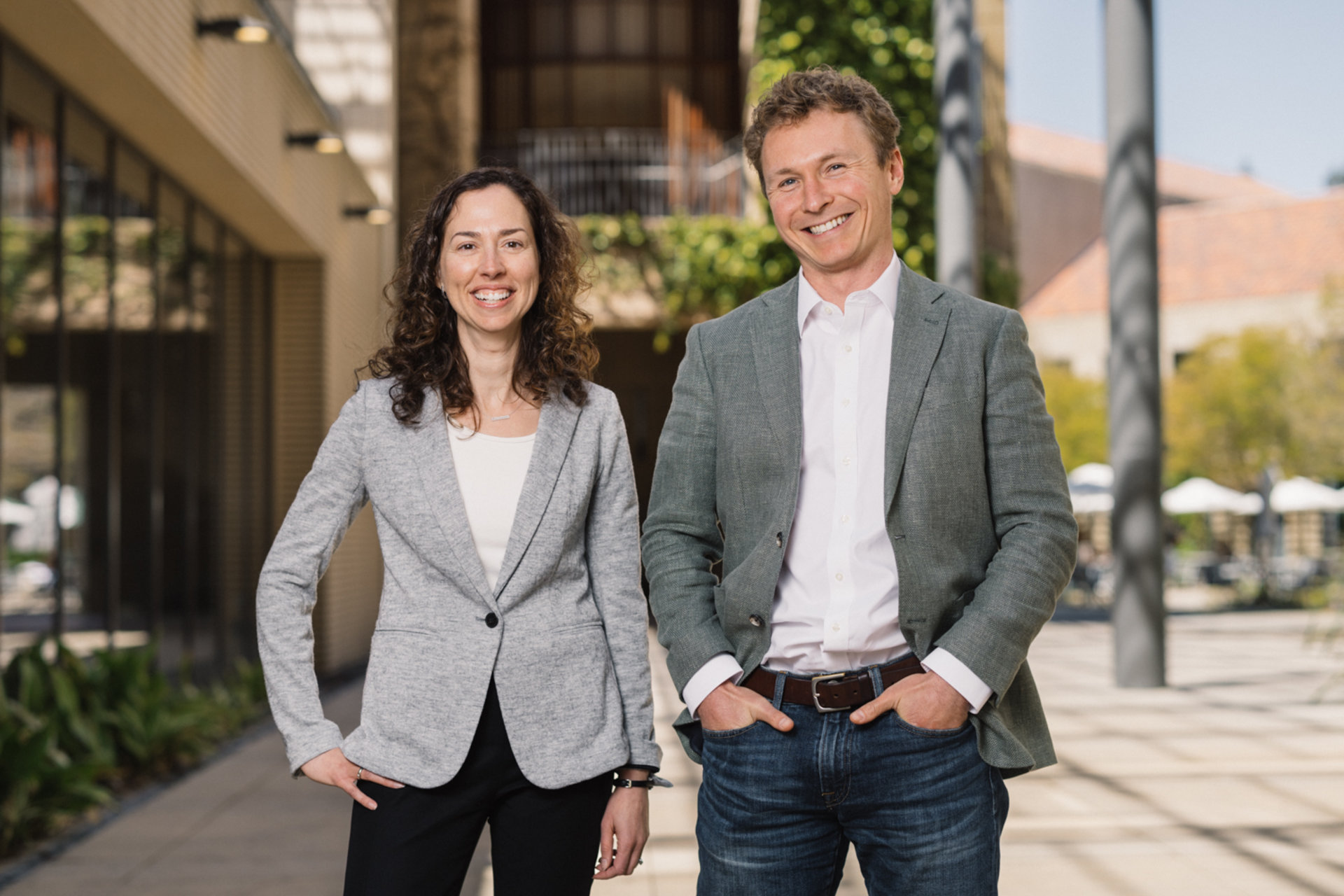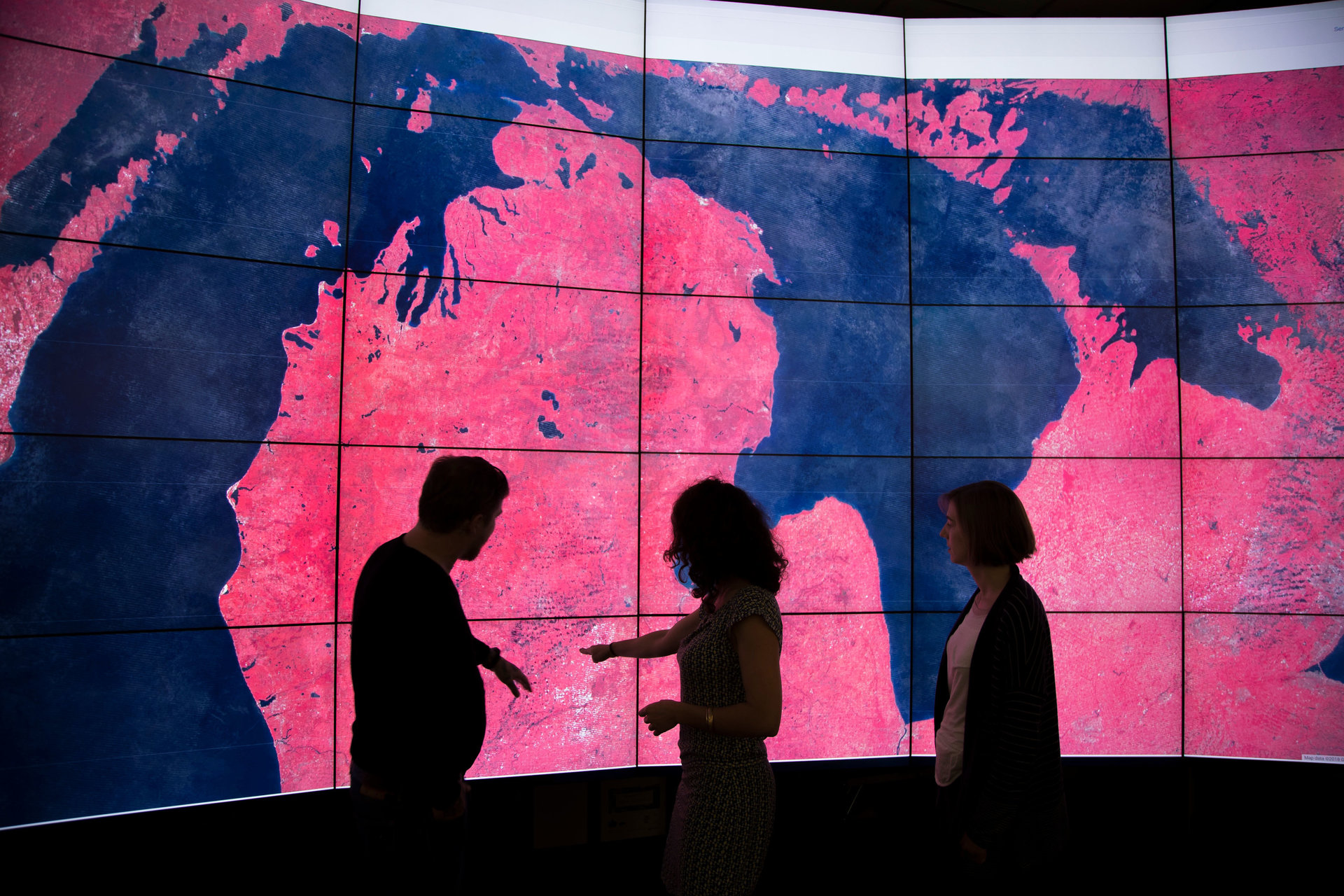New Stanford seed grants create pathways to sustainability
The sustainability initiative has awarded 17 seed grants providing one year of funding to faculty pursuing groundbreaking ideas for sustainability solutions.
The sustainability initiative that arose out of the Long-Range Vision has awarded 17 seed grants providing one year of funding to faculty pursuing groundbreaking ideas for sustainability solutions.
The grants focus on a broad scope of sustainability research and each includes an integration of research with education or outreach. A nine-person review team spanning six of Stanford’s seven schools was co-led by LYNN HILDEMANN , professor of civil and environmental engineering, and SCOTT FENDORF , professor of Earth system science, who also together led the design team on climate and sustainability.
The projects were selected based on eight central themes that the committee felt were important: human-planetary health, oceans, energy-climate, risk-resilience-hazards, food-water, cities-communities, sensing-management and socio-political frameworks.
"This really galvanizes the entire university and I think that’s critical for advancing sustainability," Fendorf said. "These proposals are really laying the groundwork for these thematic areas to make big inroads in sustainability efforts."
Of the 81 submissions considered from the call for proposals , the panel chose 17 finalists based on their relevance to 21st-century sustainability challenges; ambition in scope, scale and impact; and demonstrated potential for sustained effort.
"I am very excited to see us getting started right away," Hildemann said. "The proposals reflect many areas of strength within Stanford, where we can have an especially sizable and positive impact on the sustainability challenges our world faces."
The following projects received funding beginning in September 2020:
A Social Science/Sustainability Incubator: Interdisciplinary Scholarship and Practice to Amplify Impact and Redefine Solutions (socio-political) - Nicole Ardoin, associate professor of education; and James H. Jones, associate professor of Earth system science
Stanford as a Living Lab Accelerator: A Nexus for Urban Systems Research, Education and Impact (food-water/energy) - Craig Criddle, professor of civil and environmental engineering; Alexandria Boehm, professor of civil and environmental engineering; Sally Benson, professor of energy resources engineering; Meagan Mauter, associate professor of civil and environmental engineering; Julia Nussbaum, associate director of water planning and stewardship; and Patrick Archie, lecturer in the Earth Systems Program and director of the O’Donohue Family Stanford Educational Farm
Action Lab for Planetary Health (ALPHA) (human-planetary health) - Michelle Barry, professor of medicine; Stephen Luby, professor of medicine; and Alison Phillips, executive director of the Stanford Center for Innovation in Global Health
Startup Funding for the Stanford Carbon Removal Initiative (energy-climate) - Chris Field, professor of biology and of Earth system science; Arun Majumdar, professor of mechanical engineering; and Sally Benson, professor of energy resources engineering
Sustainable California Water Management: Integrating Across Use Sectors and Management Regimes (water) - Richard Luthy, professor of civil and environmental engineering; Bruce Cain, professor of political science; Scott Fendorf, professor of Earth system science; and Barton Thompson, professor of law
Initiative for Environmental Equity and Sustainability at Stanford (socio-political) - Rob Jackson, professor of Earth system science; Gabrielle Hecht, professor of history; Sibyl Diver, lecturer in the Earth Systems Program; and Emily Polk, advanced lecturer in the Program in Writing and Rhetoric
Thriving Livelihoods and Sustainable Ecosystems in Lower-Income Countries (cities-communities) - Stephen Luby, professor of medicine; Grant Miller, associate professor of medicine; Erica Plambeck, professor of operations, information and technology; Angelle Desiree LaBeaud, professor of pediatrics; David Lobell, professor of Earth system science; Giulio De Leo, professor of biology; Stephen Felt, professor of comparative medicine; and Gretchen Daily, professor of biology
One Ocean: A Vision for Transformative Ocean Research, Education and Impact at Stanford University (oceans) - Rob Dunbar, professor of Earth system science; Karen Casciotti, professor of Earth system science; Steven Monismith, professor of civil and environmental engineering; Fiorenza Micheli, professor of biology; Mark Denny, professor of biology; and Jeff Koseff, professor of civil and environmental engineering
Sustainable Energy Infrastructure for Adapting to Climate Change and Extreme Weather Events (energy-climate) - Sally Benson, professor of energy resources engineering; Peter Glynn, professor of management science and engineering; Ram Rajagopal, associate professor of civil and environmental engineering; and Adam Brandt, associate professor of energy resources engineering
Resilience Engineering: Interventions to Maintain Ecosystem Value During Climate Change (risk-resilience-hazards) - Stephen Palumbi, professor of biology; Chris Field, professor of biology and of Earth system science; Rob Dunbar, professor of Earth system science; Fiorenza Micheli, professor of biology; Elizabeth Hadly, professor of biology; and Anthony Barnosky, professor of biology
Taking the Pulse of Monterey Bay: Revolutionizing Oceans Research and Education (oceans/sensing) - Karen Casciotti, professor of Earth system science; Fiorenza Micheli, professor of biology; Rob Dunbar, professor of Earth system science; Steven Monismith, professor of civil and environmental engineering; Jeff Koseff, professor of civil and environmental engineering; Manu Prakash, associate professor of bioengineering; Mark Denny, professor of biology; Leif Thomas, associate professor of Earth system science; and Barbara Block, professor of biology
Creating a Digital Revolution for Ocean Stewardship (oceans/sensing) - James Leape, senior fellow at the Stanford Woods Institute for the Environment; and Fiorenza Micheli, professor of biology
Human and Planetary Health Accelerator: Action Pathway to Link the New School of Sustainability with the School of Medicine (human-planetary health) - Giulio De Leo, professor of biology; Rodolfo Dirzo, professor of biology; Craig Criddle, professor of civil and environmental engineering; Kari Nadeau, professor of medicine and of pediatrics; Erica Plambeck, professor of operations, information and technology; James H. Jones, associate professor of Earth system science; Michele Barry, professor of medicine; Nicole Ardoin, associate professor of education; and Stephen Luby, professor of medicine
Stanford Future Bay Initiative: Contributing to a Sustainable, Equitable and Resilient Urban Future for the Bay Area (risk-resilience-hazards) - Jenny Suckale, assistant professor of geophysics; Jack Baker, professor of civil and environmental engineering; Gabrielle Wong-Parodi, assistant professor of Earth system science; Bruce Cain, professor of political science; Daniel Ho, professor of law and of political science; and Derek Ouyang, lecturer in geophysics
Fighting Fire with FIRE: Preventing Catastrophic Wildfires in California and Beyond (risk-resilience-hazards) - Alexandra Konings, assistant professor of Earth system science; Michael Wara, senior research scholar at the Stanford Woods Institute for the Environment; and Meagan Mauter, associate professor of civil and environmental engineering
Developing Sustainable WUI Policies, Programs and Regulations for Wildfire Mitigation on California Rangelands (risk-resilience-hazards) - Bruce Cain, professor of political science; Kari Nadeau, professor of medicine and of pediatrics; and Inês Azevedo, associate professor of energy resources engineering
Taking the Pulse of Cities with Fiber-Optic Seismology (cities/sensing) - Biondo Biondi, professor of geophysics; Jack Baker, professor of civil and environmental engineering; Hae Young Noh, associate professor of civil and environmental engineering; Lucia Gualtieri, assistant professor of geophysics; and Greg Beroza, professor of geophysics
Explore More
-
The Stanford Forum on the Science of Energy Transition brought together scientific experts, technology innovators, and industry leaders to explore practical pathways to a decarbonized future.
-
A unique hands-on class teaches Stanford Law School students how to work with early-stage companies that have the potential to move the needle on climate and sustainability.
-
The first group of scholars supported under the new Sustainability Accelerator Fellowship program will focus on the challenge of removing billions of tons of greenhouse gases annually from Earth’s atmosphere by the middle of this century.



